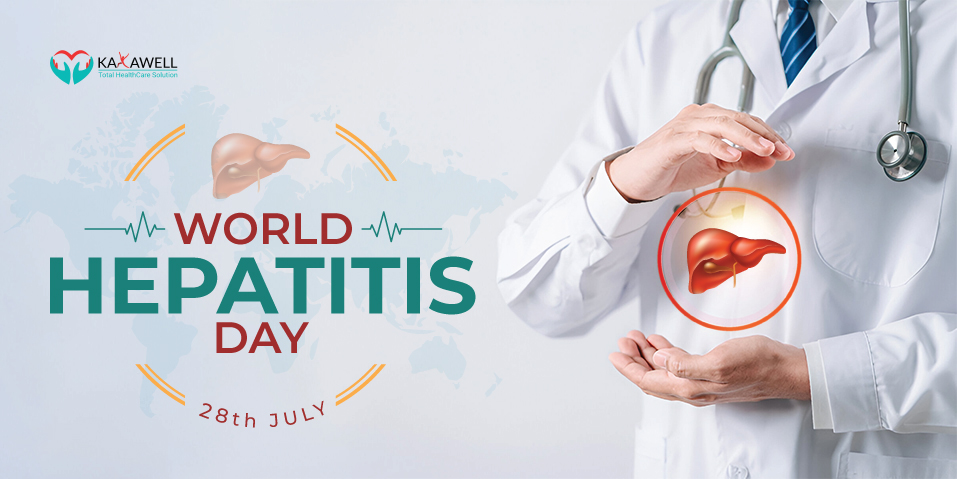World Hepatitis Day: Why and When World’s Celebrate
World Hepatitis Day is an important day because Hepatitis A and B are Vaccine-preventable diseases, yet they continue to be the most commonly reported vaccine-preventable diseases. Getting vaccinated, especially if you are at high risk, provides the best protection from these diseases.
Every year, on July 28th, the world comes together to observe World Hepatitis Day. This day is devoted to promoting awareness of viral hepatitis, which is a collection of infectious diseases that afflict millions of people globally and goes by the names hepatitis A, B, C, D, and E. Every year, World Hepatitis Day has a different subject, but the basic objective is the same: raising awareness of the prevalence of viral hepatitis throughout the world and motivating action to prevent and control the disease.
Types of Viral Hepatitis
Hepatitis A virus (HAV): Hepatitis A is usually a transient infection that goes away on its own. It is typically spread by consuming tainted food or water. Having a vaccination can stop HAV.
Hepatitis B (HBV): Transmitted by coming into touch with bodily fluids that are infectious, such as blood, semen, or vaginal secretions, hepatitis B can cause liver cancer and chronic, Fatty liver disease. There are vaccines available, and they work well.
Hepatitis C virus (HCV): Mostly spread by blood contact, HCV can develop into a chronic infection that can cause life-threatening liver issues. HCV cannot be prevented, however, antiviral drugs can treat the illness.
Hepatitis D (HDV): Requires HBV for replication, hence it only manifests in hepatitis B patients. It is spread by coming into contact with infectious bodily fluids. HDV is also prevented by vaccination against HBV.
Hepatitis E (HEV): Like hepatitis A, HEV is typically contracted by drinking tainted water. In most cases, hepatitis E is acute and self-limiting, but in pregnant women, it can be rather serious.
Read More: How Fitness Improves Your Physical & Mental Health?
The Importance of World Hepatitis Day
Raising Awareness
To increase awareness of the global impact of viral hepatitis, World Hepatitis Day is essential. Hepatitis is a serious illness, although it frequently goes unreported. A lot of people don’t know they’re infected, which can cause delayed diagnosis and treatment and serious liver damage or liver cancer disease. World Hepatitis Day promotes awareness of the signs, dangers, and prevention of hepatitis through several initiatives and activities.
Encouraging Testing and Vaccination
The two most important tactics in the fight against hepatitis are early detection and immunization. On World Hepatitis Day, everyone is urged to be tested, particularly those who are more vulnerable. It also emphasizes how crucial it is to get vaccinated against hepatitis A and B. Treatment outcomes for hepatitis C and D might be considerably enhanced by early diagnosis.
Reducing Stigma and Discrimination
Individuals who have hepatitis frequently experience discrimination and stigma, which can make it difficult for them to get care and assistance. By informing people about the realities of having hepatitis and fighting for the rights and dignity of those who are afflicted, World Hepatitis Day seeks to lessen this stigma. Through awareness campaigns and victim stories, the day promotes a more welcoming and encouraging atmosphere.
Mobilizing Global Action
To eradicate hepatitis as a hazard to public health, World Hepatitis Day provides a forum for international action. Together, governments, healthcare professionals, and organizations pledge to implement policies and initiatives that improve diagnosis, treatment, prevention, and support services. The day highlights the necessity of an all-encompassing and well-coordinated reaction to accomplish global health targets.
Historical Context and Significance
Why July 28?
In observance of Dr. Baruch Blumberg’s birthday, who discovered the hepatitis B virus and created the first hepatitis B vaccine, July 28 is designated as World Hepatitis Day. Millions of lives have been saved by his ground-breaking work, which also serves as an inspiration for current hepatitis campaigns.
The Role of the World Health Organization (WHO)
World Hepatitis Day is coordinated and promoted in large part by the World Health Organization (WHO). To increase access to hepatitis prevention, testing, treatment, and care, WHO’s Global Hepatitis Programme collaborates with nations and partners. The yearly themes and events of World Hepatitis Day represent WHO’s commitment to ending hepatitis as a public health threat by 2030.
Themes and Campaigns
Each year, World Hepatitis Day adopts a specific theme highlighting different aspects of hepatitis prevention and control. Recent themes have included “Hepatitis Can’t Wait” (2021) and “Bringing Hepatitis Care Closer to You” (2022). These themes guide the development of campaigns and events that resonate with the current global context and needs.
Conclusion on World Hepatitis Day:
World Hepatitis Day is a vital observance that brings global attention to the fight against viral hepatitis. It is a day to honor the progress made, recognize the challenges that remain, and renew the commitment to eliminating hepatitis as a public health threat. By raising awareness, encouraging testing and vaccination, reducing stigma, and mobilizing global action, World Hepatitis Day plays a crucial role in the journey towards a world free of hepatitis. On July 28th, let’s come together to support this cause and take steps towards a healthier future.



